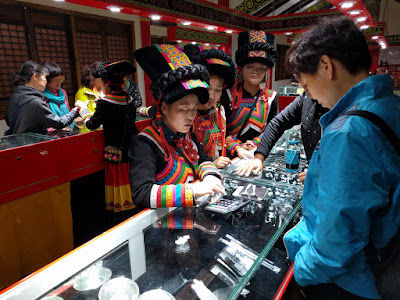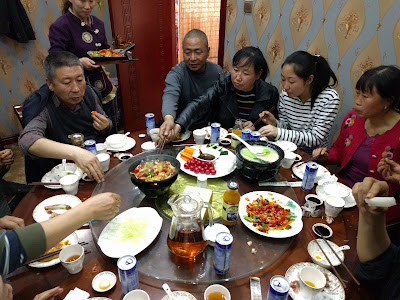Eventually, we got to a crystal museum near Anzitang. We got badges to wear and a neatly dressed, young tour guide. The place is beautifully designed, with some impressive crystal art. The tour guide kept emphasizing that we should stick around with him if we want to see the good stuff. That was odd. Where else would we go?
We were then led to the huge store in the upper floor, where we were supposed to wait 30 minutes until 9:30 in the morning, when they would let us into the restaurant for us for lunch. At 9:30. The organizer’s argument was that later, when we’re travelling, there would be no other opportunity. Julia’s theory was that they want to keep us in the store so that we would buy bullshit crystal jewelry, and lunch is just an excuse.
We got back to the bus and went to see the Leshan big Buddha. On the way we picked up a new tour guide, Xiao Peng, a young woman with chubby cheeks, who refers to herself in the third person. When we got there, she explained to us the proper ways to take a picture with the Buddha, like having him in the background and stretching your arm to make it look like you’re rubbing his nose or ear. These are supposed to bring you good luck or some other bullshit. Anyway, we looked at the Buddha from up the hill, and then started climbing down.
There’s a certain degree of violence that is acceptable in China. It’s ok for you to squeeze in line in order to get ahead of other people, even if it causes significant discomfort to them. This is really hard for me to grasp, even as an Israeli. Even though we were doing our best to go with the flow with the rest of the people, everyone seemed to be passing us. Julia overheard a person who noticed us summarizing to his friend the cultural gap: “do foreigners even know how to shove?”
We got to the bottom and started climbing back up the stairs.
Back at the top, we joined Xiao Peng and our group, and we all walked to a temple.
There, Xiao Peng would not shut up. Some of her spiel was about Chinese astrology bullshit, and how some people are missing one of the five elements, and an analysis of a person's name and date of birth can determine which. Some of it was about herself: she has been a tour guide for 12 years after graduating from a school for tourism. I guess you can say she got a B.S. in BS. She said her commission is per group, so she only has to take one group a day, and then she can go home to play Mahjong. Speaking of Mahjong, she wins nine out of ten games, because she’s very lucky, as one can tell from her name and date of birth. Naturally. She offered to anyone who’s interested to write their names and date of birth on a piece of paper and she’ll gladly figure out which element that person is missing. Some people, led by a pretty young lady wearing a rainbow scarf, rushed to give her tiny pieces of paper. We thought that Xiao Peng can go fuck herself.
We walked down the mountain and then the entire group had to take a public bus, which was strange, because we had a bus. We went two stops to see pictures of funky things that happened to the Giant Buddha, like how it looked like he was crying or closing his eyes after natural disasters. The pictures were located on a wall in a store, that sold little buddha pendants. As the tour guide then explained, different kinds of pendants complement the different elements people are missing, and what do you know - some people in our group discovered, very recently, what element it is! Miss Rainbow was super happy about this fortunate coincidence and bought herself a stupid little pendant.
It was now pretty clear that peddling is a major part of this trip, and we must, as the zeitgeist commands, resist.
Next, we were taken to visit the Yi, a minority group that lives in the area. A Yi lady greeted us, took us to a room where we were served boiled potatoes, something that looks like tamales, and a tiny shot of some alcoholic stuff. Then she started talking about the Yi. Very quickly, the focus of her talk moved to two topics: how poor they are, and how their health is maintained by using silver bowls in which they mix their medicine. Sure enough, when she was done talking, we were led to their store, where we could buy silver stuff. This must have been Miss Rainbow’s lucky day. She bought herself a silver bracelet.
Dinner was actually OK, and it included a show, which was also pretty good. We sat a table with people from our group and another group and had hot pot. The show included a Wu Shu act, a pair of acrobats and an act of traditional Sichuan opera face changing masks: the performers wear masks that change instantly as they move around on the stage. The technical side of this artform is kept secret, and I couldn’t find a definite explanation of how this is done.


















































